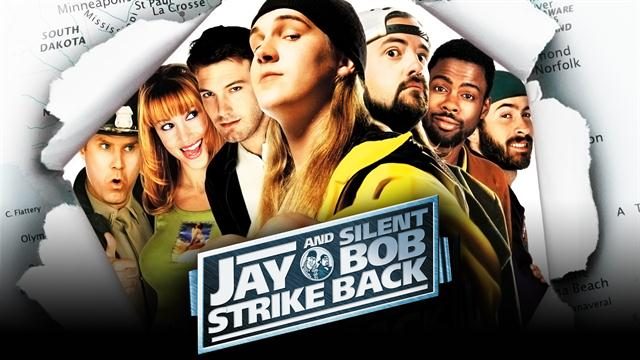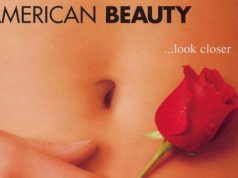
By the time Kevin Smith made “Jay and Silent Bob Strike Back,” in 2001, he’d already secured a place in the pantheon of Cool Gen-X Filmmaker Geeks with his four previous efforts: “Clerks,” “Mallrats,” “Chasing Amy,” and “Dogma.” They were all set in the same universe, with characters from one film popping up in the others, an ingenious gimmick that gave Smith’s fans the feeling that they were all insiders. It helped that each movie featured an appearance by the cuddly, ursine Smith himself, in the guise of Silent Bob, affable partner to the motormouthed vulgarian pothead known as Jay (Jason Mewes).
I came late to the party. I discovered (and loved) “Clerks” just before “Dogma” came out, and while I never saw “Chasing Amy” or “Mallrats,” what I experienced of Smith’s work appealed to me. The films struck me as funny, irreverent, and intelligent summations of Smith’s generation. Since I was part of that generation (he’s four years older than me), and since I was in my mid-20s when I found him, his obsession with pop culture was right up my alley.
“Jay and Silent Bob Strike Back” was the culmination of Smith-ism, piling all of his characters and fixations into a movie that also happened to have a good-sized budget and would be chock-full of celebrity cameos. It was a movie just for Smith’s loyal admirers, like something a fan club would send out to its charter members. And I ate it up.
What I said then:
“A parody of modern filmmaking that is itself a compelling example of it — a movie that has room to dish out criticism, because it can withstand the same when it’s flung back…. The film is one giddy set piece after another, full of cameos from celebrities who clearly just love Kevin Smith movies and wanted to be in one…. The jokes are surprisingly on-target and fresh, with few misfires…. The film is self-indulgent [but] the reason the self-indulgence is OK is that we like Kevin Smith. He’s the cool, popular kid in school who doesn’t fit with any of the cliques but is accepted by all of them. I hope he hangs around with us for a long time.” Grade: A- [complete review]
Even at the time, my review was more effusive than most. The film had a 53% positive rating at Rotten Tomatoes, with an average score of 5.7 out of 10 — suggesting that even among those who praised the movie, not many looooved it. I wish I could find my notebook from back then so I could see what I jotted down during the screening.
This would turn out to be Kevin Smith’s high point in some ways. It was his widest release to date, and even now is second only to “Cop Out.” Its U.S. box-office gross of $30.8 million was barely behind “Dogma” for first place, and has since been surpassed only by “Zack and Miri Make a Porno” (barely) and “Cop Out.” He didn’t make another film for three years, and it was the much-derided “Jersey Girl.” He followed that with “Clerks II” and “Zack and Miri,” both obvious and not particularly successful attempts to recapture his former profane glory. And then there was “Cop Out,” whose critical drubbing led Smith to rant on Twitter about how the critics were biased against him. (He was partially correct. Critics are biased against bad movies, and he made a bad movie.)
The re-viewing:
Having been moderately to significantly disappointed by all of Smith’s subsequent films, I was eager to re-watch one from the glory days. Some classic Smith! That’s what the doctor ordered.
Well, the doctor’s order has gone unfilled. I re-watched “Jay and Silent Bob Strike Back” and was astonished — dumbfounded — at how awful it was. I barely cracked a smile. Mostly I sat there in stoned-faced disbelief. What an insufferably unfunny mess! How could 2001 Eric and 2011 Eric have such wildly divergent views on the same movie?
The major problem, I think, is that “JASBSB” was very “of the moment,” and that moment has passed. The jokes about Miramax and its stalwarts (like Gus Van Sant and Wes Craven) are all hopelessly out-of-date now. So are the Affleck and Damon bits and the cameos by James Van Der Beek and Jason Biggs. It’s like watching an SNL “Weekend Update” segment from a decade ago. You understand what the jokes mean — and they were probably funny at the time — but they don’t have any resonance anymore.
My 2001 review said this: “A parody of modern filmmaking that is itself a compelling example of it — a movie that has room to dish out criticism, because it can withstand the same when it’s flung back.” I laughed when I re-read that, because on the second viewing, I’d had exactly the opposite opinion.
Someone in the movie, objecting to the development of a film about Jay and Silent Bob, says that they’re “one-note jokes that only stoners laugh at.” There are many such meta-jokes sprinkled throughout the film, Smith’s way of responding to people who were skeptical about the idea of “Jay and Silent Bob Strike Back.” Ideally, those skeptics are watching it and thinking, “Wow, this is actually pretty good. We stand corrected. Well played, Smith!”
But here’s what I was thinking: “Yeah, Kev, they ARE one-note jokes. Yeah, actually, there ISN’T enough material here for an entire movie. As a matter of fact, you should not have been nearly as confident about this as you were.”
I also kept thinking: “Why is every character in this movie — not just Jay and Silent Bob but EVERYONE — so obsessed with gay sex?” The entire run of “Queer as Folk” had fewer references to gay sex than this movie does. It isn’t that the jokes are offensive, but that they’re so numerous, suggesting that Smith has a very, very short list of things he thinks are funny and has to keep coming back to the same ones.
I counted four separate instances of characters making a wink-wink meta-joke and then turning to look directly at the camera — you know, in case we didn’t understand that “a Jay and Silent Bob movie? Feature length? Who’d pay to see that?” was a reference to THIS movie! The one we’re watching!! One of those bits might work. But four? Yeesh. It’s like the movie is so pleased with being self-referential that it can’t stop telling us how self-referential it is.
The humor is generally blunt and obvious in that way. For example, Mark Hamill shows up and has a light-saber fight with Jay and Silent Bob. It ends with his hand being sliced off — a joke that every single member of the audience gets immediately, because that’s what happened to Luke Skywalker. WE GET IT. Yet Smith underscores the joke by having Hamill say, “Not again!” Ugh.
Damon and Affleck’s goofy self-parody made me chuckle a little, as did Chris Rock’s turn as an angry director. My beloved Will Ferrell, for whom I have a confessed weakness, elicited what, two or three small laughs? How is that even possible??
Do I still love this movie?
Wow, no. The Hollywood parodies are dated and clunky, the central characters tiresome, the vulgarity mostly un-clever. The self-indulgence that I enjoyed 10 years ago because Smith was in his prime now just seems desperate and smug. I suspect that one’s satisfaction with “Jay and Silent Bob Strike Back” is dependent on one’s current level of fondness for Kevin Smith in general. Lapsed devotees like myself won’t find anything to re-convert them. Grade: D
— Film.com




